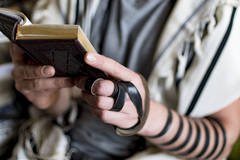President's message BeHar 5/20/22
| Author | |
| Date Added |
Dear friends,
BeHar, this week's Parsha, describes the rules and regulations of the
Yovel, or jubilee year. We are instructed to count the years up to 50,
much like we were commanded to count the days in last week's Parsha
where we discussed the Omer.
There is a difference, however, in the texts describing the two. The Torah
uses the plural when instructing us to count the Omer and the singular
for the Yovel. Every single Jew is supposed to count the Omer, but it’s the
Sanhedrin, the supreme court, the leaders of the Jewish people, who are
supposed to count the Yovel, on behalf of the people.
Rabbi Sacks z”l learns from this that the people are involved with the day
to day, but the leaders must be concerned with planning long term, for the
future. Rabbi Sacks goes on to give several examples of the leaders who had
the concept of the long view.
Ben Zoma states a person is wise who foresees the consequences. Moses
speaks to the Israelites about how they will tell the story of the Exodus to their
children in years to come. Jermiah, Ezra, Nehemia, the Early Sages, the Later
Sages, and the Rabbis and scholars of the more recent past and present…they
all planned out the future survival of the Jewish people. How to live in exile,
the writing of the Mishnah and the Talmud, the study of Torah and emphasis
on keeping Torah life and learning alive. Their foresight and planning is what
allowed the Jewish people to survive.
Leaders must plan the survival of the future so that people can live day to day. (For Rabbi Sacks' complete dvar, please click here )
• • •
The need to plan for the future is central to all of us. We plan for our children,
for our retirement, for all of the institutions we hold dear to be there when we need them.
I hope that B’nai Avraham can count on your support as we celebrate our
33rd year. I look forward to seeing all of you at the Gala on June
14. I personally thank all who have already pledged, and urge those
who have not yet done so to support the Shul as much as they can. All
contributions help to ensure our continued growth and our ability to
offer not only a place to pray but also a place to share a community.
I just left our wonderful Lag B’Omer celebration and thank the Rabbi and Shternie
for a truly wonderful program both as a celebration of Lag B'Omer, but also
as an opportunity to reach out to new community members and give a taste
of what we have to offer.
May we all have a peaceful and meaningful Shabbat Shalom,
Steven Inker
President's message Achrei Mot, 4/30/22
| Author | |
| Date Added |
Dear friends,
This week's parsha, Achrei Mot, goes into the details of the Yom Kippur service. HaRav Kook, in his book Olat Re’iyah, notes the difference between the chatatsacrifice that is brought on festivals and the one brought on Yom Kippur. The chatat sacrifice is a sin offering and is generally brought when one accidentally hurts or causes damage to another.
The usual sacrifice is a goat but on Yom Kippur it is a goat and an ox. Rav Kook explains that while both the goat and the ox symbolize power, the goat is destructive in nature, overgrazing and eating the roots of plants, while the ox is constructive, used in cultivating and building. Usually we bring a goat because most damage and hurt is caused by destruction (property damage, etc).
But on Yom Kippur we acknowledge that, even when we build––our property, our business, our life––we run the risk of inadvertently hurting others in the process. This is what we have to be acutely aware of, not just on Yom Kippur but throughout the year. All of our actions have repercussions, and achieving success for ourselves truly occurs if we don’t hurt others in the process.
• • •
The success of our Shul involves being involved. As the weather gets nicer, I hope that everyone feels comfortable attending our minyanim in person.
My thanks go to the handful of members who have already paid their dues. If you are not yet one of them, you can pay by credit card via the shul website
(BnaiAvraham.org) or send or drop off your dues check to 117 Remsen Street. It's much easier to run CBA when the dues are paid in the beginning of the year. (From the earliest days of the synagogue, our dues were payable at the beginning of the year, not at the High Holidays.)
The other major fundraiser for CBA, our annual gala “dinner," will take place on June 14. There will be an in-person component and we are considering many ideas, for the best opportunity to bring people together. As soon as the details are in place, I'll let everyone know.
Wishing everyone a peaceful and meaningful Shabbat Shalom,
Steven Inker
President's Message 4.21.22
| Author | |
| Date Added |
Dear friends,
While it’s still Pesach, I’m going to share a brief insight about the holiday. (I’m giving credit to my brother who shared it with me but any errors in this are entirely on me.)
If you’ve noticed, the first day of Pesach is always the same day as Tishah B’Av. On the surface, the holidays could not be more different: one teaches us about the miracle of the Exodus from Egypt, while the other has us remember the destruction of both Temples. What is the uniting factor? We have to go back to the origins.
We are taught that the destruction of the Temple was ultimately caused by Sinat Chinam, "groundless hatred." Jew hating Jew. If we trace back the path of how the Jewish people got to Egypt, we eventually get to the story of Joseph and his brothers. Sinat Chinam caused Joseph to find himself in Egypt after being thrown in the pit, and Joseph’s rise to power eventually brought Jacob and his family to Egypt. Sinat Chinam is the cause of so much of our misfortune, and our continuing exile. May we be able to identify it in our own lives and thereby conquer it and bring about a brighter future for all.
• • •
Speaking about bright futures, the Seudat Moshiach is this Shabbat after Minchah, at 7:25 pm. All are welcome and it’s free but please RSVP to ravraskin@gmail.com
Right after the Chag, the board will pick up again on plans for the Annual Dinner and the items it started tackling last month: the Ritual Committee, kiddushes, safety and security, job descriptions and the hiring of staff to help with the running of the building and programming.
We have also been thinking of some guest speakers and I’m still pushing for a Rosh Chodesh BBQ event. We’ll see what we can get off the ground and will alert everyone when things are finalized.
Keep an eye out for the 2022 dues invoices, which will finally be sent out next week, and please pay them promptly.
Daily Shacharit Minyan attendees: on Rosh Chodesh and Chol Chamoed, please be present and ready to start right at 7:45 am. On days with a Torah reading + Hallel the service is longer than usual and needs to be concluded before people walk into their offices. Your efforts on this front are much appreciated.
Continued thanks to everyone who has given me ideas and input. All ideas and constructive criticism are welcome. You can email or text or WhatsApp me anytime:president.bnaiavraham@gmail.com or 917-620-8762.
Wishing everyone a Chag kasher v’sameach and Good Shabbos,
Steven Inker
Sun, November 9 2025
18 Cheshvan 5786
Today's Zmanim
| Alos Hashachar | 5:12am |
| Earliest Tallis | 5:44am |
| Netz (Sunrise) | 6:35am |
| Latest Shema | 9:07am |
| Zman Tefillah | 9:58am |
| Chatzos (Midday) | 11:40am |
| Mincha Gedola | 12:05pm |
| Mincha Ketana | 2:37pm |
| Plag HaMincha | 3:40pm |
| Shkiah (Sunset) | 4:44pm |
| Tzais Hakochavim | 5:26pm |
| More >> | |
Follow Congregation B'nai Avraham's Social Media channels
 If you're on Social Media, follow our shul.
If you're on Social Media, follow our shul.
__________________________
•YouTube (Bnai Avraham)
__________________________
•WhatsApp Daily/Main Minyan
•WhatsApp Hasgacha Minyan
•WhatsApp General Chat
•WhatsApp Sisterhood
To join any of the above WhatsApp groups, write to request an invite: Shternieraskin@gmail.com
__________________________
•WhatsApp Daf Yomi
To join the Daf Yomi group, write to request an invite:
__________________________
Click here to read some of what the Rebbe said about the use of technology in spreading words of Torah.
Jewish News Links
These external news links provide general information and their listing here in no way implies an endorsement.
Brooklyn News Links
These external news links provide general information and their publication here in no way implies an endorsement.
Candlelighting Times
B'nai Avraham is your Brooklyn Heights shul
117 Remsen St
Between Clinton and Henry
streets in Brooklyn Heights
Shabbos

FRIDAY Mincha and Kabbalat Shabbat/Maariv): 7 pm during the summer
SATURDAY: Shacharit 8 am and 10 am
Mincha/Maariv: at candellighting time
[Note: a single Shabbos Shacharit minyan at 9 am takes place yom tovim, shabbatons, smachot, US holiday weekends, and summer from Independence Day through Labor Day. ]
KIDDUSH THIS WEEK is sponsored by Ed and Julie Rubinchik, in honor of Joshua’s graduation from Tulane. Yippee-ay-yay and mazal tov!
And Kiddush next week is sposored by Marty Baumrind, in honor of his mother‘s 95th birthday. It falls on Tisha B'Av on both her Hebrew and English birthdays this year, quite unusual. Thanks very much, Marty!
Weekday Minyanim

.
.
To receive timely weekday minyan updates, please join the WhatsApp group. Write office@bnaiavraham.org to join.
SHACHARIS
Monday to Friday: 7:45 am
Sunday: 8:45 am
MINCHA/MAARIV:
Sun: at candle-ighting time
Monday thru Thursday: 8 pm
Let's Learn! Classes this week at CBA
Schedule subject to change
•Sunday 11:00 am
The David Berg Lecture Series
Perkei Avot study with Rabbi Aaron Raskin. In person and on Zoom.
Meeting ID 217 795 2137. Passcode 06355
•Monday 8:15 pm
Halacha with Rabbi Yankel Raskin (in person). Email heightsrabbi@gmail.com for more information.
•Monday 8:30 pm
Daf Yomi (on Google Meet)
For link write: Mark_Zelcer@gmail.com
•Tuesday 8:15 pm
Parsha with Rabbi Hubner, in person and click here for Zoom.
•Wednesday 9:15 am
Parsha class for women
with Rabbi Raskin.
In person or on Zoom:
Meeting ID 217 795 2137.
Passcode 06355
Thursday 9:30 am
Maamar: Chassidic DIscourses on the upcoming holidays
Meeting ID 217 795 2137.
Passcode 06355
Thursday 8:30 pm
Daf Yomi (see Monday)
•Saturday 9:30 pm
Daf Yomi (see Monday)
Join Our Mailing List
Stay in touch with the shul. Choose what communications you'd like to receive.




